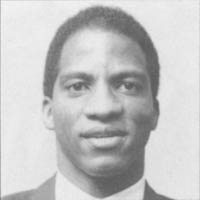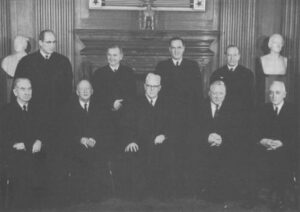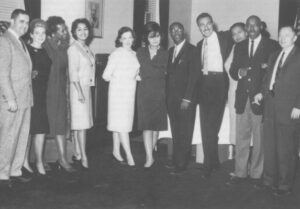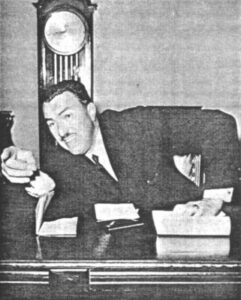Wil Haygood
- 1988

Fellowship Title:
- The Life and Politics of Adam Clayton Powell, Jr.
Fellowship Year:
- 1988

The Supreme Court Decides the Fate of Adam Clayton Powell, Jr.
Florida Congressman Claude Pepper huddled quickly with other colleagues after the U.S. House voted to exclude Adam Clayton Powell, Jr. on March 1, 1967. Powell was the first House member to suffer such a fate since 1919, when the House excluded Victor Berger, charged with violation of the Espionage Act. Powell immediately threatened to fight his ouster in federal court. Pepper suggested to House Speaker John McCormack that they go to New York City and talk with Bruce Bromley about handling the Powell legal challenge. Bruce Bromley had credentials. He was one of the most prominent trial lawyers in America at the time. Bruce Bromley was Harvard Law. He was Cravath, Swaine & Moore, a silkened law firm, perhaps New York City’s most admired. Bruce Bromley had achieved prominence in American legal circles by simply working hard, much harder than the other lawyers around him. He found something almost soulful in drudge work. A colleague would say of Bromley that he “read documents and painstakingly studied and edited drafts of briefs, leaving the rest of

A Chairman’s Glory and Pain
It was Congress that rescued Graham Barden, born in 1896, from a town called New Bern, North Carolina. He would become a seaman, then a football coach, gleefully running up lopsided scores against opponents. By 1920 he had a law degree from the University of North Carolina. A winning football coach, in a small town, with a law degree, could surely achieve more than just Friday evening glory on a football field. So the football coach turned lawyer ran for county judge. He won. He tired of that job and ran for a seat in the state legislature, winning there, too. By 1935, the hometown walls had become too easy to scale. Graham Barden ran for Congress from North Carolina’s Ninth District. It seemed another routine victory. Barden would go to Washington as a Dixiecrat, a Democrat who was conservative and would align himself with conservative Republicans. Like so many other southerners, Barden was destined to hang on in Congress, for years, until his seniority grew, until he himself had a chairmanship. A northerner might

Powell and Eisenhower
Editors Note: APF Reporter Vol.11 #3 exsisted only as a photo copy, becuase of this the pictures in this story are of poor quality. They were not reckless with merriment, nor did they much tolerate those who were. Members, of the Eisenhower administration were much like Eisenhower himself, businesslike, plain, steady. No need to look before they jumped because they rarely jumped. Congressman Adam Clayton Powell was everything they were not; he lived to shock. One afternoon Powell called the White House and got Sherman Adams on the line. Powell told Adams he was convening an important meeting in Harlem the following Saturday and the White House must send someone. Adams turned to Fred Morrow, a special assistant to Eisenhower. Fred Morrow was a graduate of Bowdoin College. He had worked for years at CBS before joining the administration. With his blue-blood credentials, he became the first black professional to work on the White House staff. He was a serious man in a serious administration. Adams sent Morrow to Harlem to meet with Powell. Morrow

The Rise of Adam Clayton Powell, Jr.
On May 10, 1931, the Abyssinian Baptist Church in Harlem, as usual, was packed. There was a buzz in the crowd. Adam Clayton Powell, Sr., the pastor, was ill. His son, Adam, Jr., would deliver the sermon. The pulpit hardly frightened Adam Junior. He was raised in this church. The women in the audience had known him since he was an infant, saw him take his first step, stocked his room with beautifully-wrapped gifts on special occasions: he was theirs. But some of the older deacons were wary of young Powell. To them he was a bad boy, a whistler in the dark. He had been kicked out of college for spending too much time with girls, had even boasted of it. Even now he was dating a showgirl. Some Sundays he skipped church to go rowing. The poet, Alice Dunbar-Nelson, was in the audience that Sunday. After the sermon she rushed a note about the young Powell to a friend. “The boy is handsome, graceful and has marvelous personality and control of the massive
